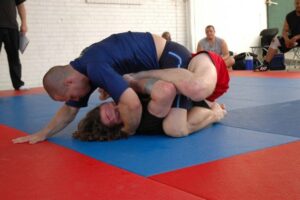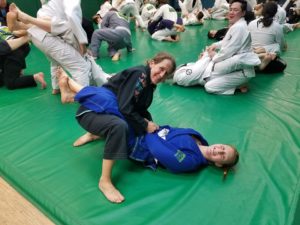 Have you ever felt like you’re cheating in Brazilian Jiu-Jitsu (BJJ) because you’re just naturally more athletic than others? Do you ever wonder if your physical prowess is actually holding you back from developing solid technique? Maybe you’ve noticed that you can muscle your way out of precarious positions or rely on your speed to catch your training partners off guard. Sure, these attributes can lead to short-term success, particularly as a white or blue belt, but could they actually be a curse in disguise?
Have you ever felt like you’re cheating in Brazilian Jiu-Jitsu (BJJ) because you’re just naturally more athletic than others? Do you ever wonder if your physical prowess is actually holding you back from developing solid technique? Maybe you’ve noticed that you can muscle your way out of precarious positions or rely on your speed to catch your training partners off guard. Sure, these attributes can lead to short-term success, particularly as a white or blue belt, but could they actually be a curse in disguise?
Welcome to the paradox of athleticism in BJJ. On the one hand, being athletic can give you a considerable advantage. It can help you execute moves faster, resist submissions longer, and even intimidate your opponents. But on the other hand, it can serve as a crutch, allowing you to bypass the painstaking process of learning and perfecting technique.
This article aims to shine a light on this paradox, exploring how an over-reliance on athleticism can, in the long run, hinder your progress in BJJ. We’ll delve into the concept of the ‘natural resource curse’ in economics and how it mirrors the athleticism curse in BJJ. Lastly, we’ll discuss strategies to strike a balance between leveraging your physical attributes and honing your technique, ensuring that your athletic ability becomes a blessing, not a curse, on your BJJ journey.
Athleticism: A Double-Edged Sword in BJJ
A robust physique, natural strength, speed, or flexibility can make your early Brazilian Jiu-Jitsu journey seem like a breeze. These physical attributes can act as accelerators, allowing you to overpower opponents, swiftly escape precarious positions, and even rack up a string of victories. This initial success can create an illusion of mastery, making you feel you’re strides ahead of your less athletic counterparts.
However, as you ascend the ranks, facing more seasoned practitioners, you’ll begin to notice that this initial boost starts to lose its steam. The once reliable crutch of athletic prowess begins to wobble under the weight of intricate technique and superior strategy. This is where the double-edged sword of athleticism in BJJ reveals its other side. While it can give you a head start, it can simultaneously hinder your progression in the art by veiling the need for technical proficiency.
Natural Resource Curse: A Lesson From Economics
The economic concept of the ‘natural resource curse’ presents a compelling analogy to the athletic paradox in BJJ. This term refers to an irony where countries abundant in natural resources, especially non-renewable ones like minerals and fuels, tend to have slower economic growth and inferior development outcomes than countries lacking these resources.
These nations, flush with natural wealth, often fall into a trap of over-reliance on their resources, neglecting to invest in critical sectors like education, infrastructure, and technological innovation. This is reminiscent of the trap many athletic BJJ practitioners fall into, where they lean heavily on their physical gifts and neglect the essential investment in mastering technique.
Take Singapore for instance, a city-state devoid of significant natural resources. Despite its lack of natural wealth, it has risen to become one of the world’s most prosperous nations. The key to its success lies in its strategic focus on education, innovation, and technology—the ‘technique’ of economic development. Contrast this with resource-rich Iran or Venezuela, and it’s not hard to see how having a lot of attributes might be a problem.
Overcoming the Athleticism Curse in BJJ
Just as countries with the natural resource curse can learn from the strategies of nations like Singapore, athletic BJJ practitioners can also break free from their curse. Here’s how:
Embrace the Learning Process: The first step is to acknowledge that BJJ is, first and foremost, a learning journey. The goal is not to win every roll but to continuously improve and master the art. This shift in perspective can help you see beyond the quick wins offered by your athleticism and focus on refining your technique.
Prioritize Technique Over Strength: Make a conscious effort to prioritize technique over physical strength during your training sessions. When you find yourself in a challenging position, instead of muscling your way out, try to recall and apply the technique you’ve learned. This might lead to more taps in the short term, but it’s a crucial part of the learning process.
Regularly Reflect On Your Game: Take the time to analyze your rolls. Are you using your strength or speed to compensate for lack of technique? Are you relying on your flexibility to escape submissions instead of proper positioning? These reflections can help you identify areas in your game where you’re leaning too heavily on your athletic abilities.
The True Power of Athleticism in BJJ
While this article might seem to paint athleticism in a negative light, it’s crucial to remember that physical attributes are not inherently bad. Just like natural resources for a country, athleticism is a valuable asset when used correctly.
The true power of athleticism in BJJ lies in its ability to complement your technique. When physical prowess is matched with technical proficiency, it can lead to a formidable game that is both efficient and effective.
In other words, your physical attributes can add flair to your game, but they shouldn’t define it. Athleticism can make a good BJJ practitioner great, but it’s technique that makes a great practitioner exceptional.
 Redefining Success in Brazilian Jiu-Jitsu
Redefining Success in Brazilian Jiu-Jitsu
Breaking free from the athleticism curse in BJJ involves redefining what success means to you. Winning a roll or a tournament might feel great, but if it comes at the expense of your technical development, it’s a hollow victory.
A more fulfilling measure of success in BJJ is consistent improvement. Are you better today than you were yesterday? Are you able to execute techniques more effectively, regardless of your opponent’s physicality? Are you becoming more adaptable, able to roll with different types of opponents, from the most athletic to the most technically proficient?
The Road to a Balanced BJJ Game
Achieving balance in your BJJ game is not about disregarding your athletic abilities. It’s about using them to complement your technical skills. It’s about being able to rely on your technique when your athleticism falls short. And it’s about understanding that technique will carry you in the long run, long after your physical attributes have peaked.
Just as nations like Singapore have shown us that it’s possible to thrive without an abundance of natural resources, it’s also possible to excel in BJJ without relying solely on athleticism. It’s a longer, tougher road, but it’s one that leads to sustainable success and true mastery of the art.
Remember, every time you step onto the mat, you’re not there to prove how strong, fast, or flexible you are. You’re there to learn, grow, and become a better martial artist. Your athleticism is a tool, not a crutch. Use it wisely, and your BJJ journey will be all the more rewarding.
In Conclusion
Athleticism can be a blessing or a curse in Brazilian Jiu-Jitsu. It can either give you a head start or hold you back, depending on how you use it. The key is to balance your physical attributes with technical proficiency and to value consistent improvement over fleeting victories.
Just like the countries suffering from the natural resource curse, athletic BJJ practitioners must learn to invest in their ‘technique’ to ensure long-term growth and success. With the right mindset and approach, you can turn the athleticism curse into a blessing, leveraging your physical prowess to enhance your technique rather than hinder it.
So the next time you find yourself muscling your way out of a tricky situation, pause and remember: Brazilian Jiu-Jitsu is not a test of your athleticism. It’s a journey of technical mastery and self-improvement. Train accordingly.